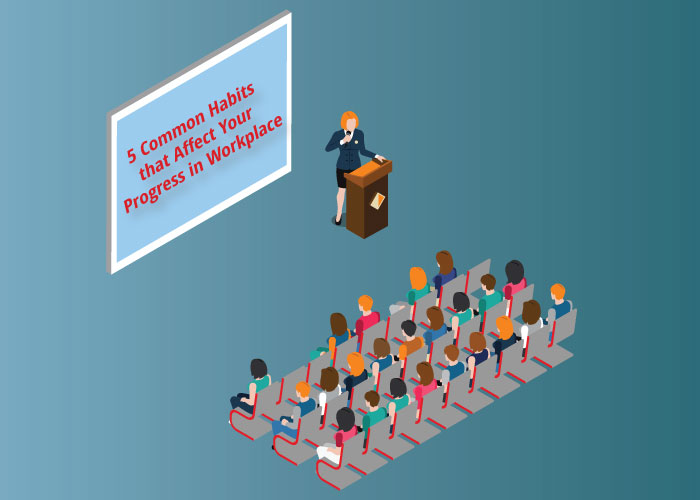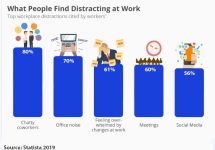
Your habits are the guiding force for your career & life. Subconsciously, we develop habits that can harm us & affect our progress in the workplace.
We get into cycles of events, thoughts and procrastination that stops us from reaching our full potential. But to excel and thrive in a competitive world, we need to do our best every day and master our routines.
Procrastination, delaying things without any reason, unfocused mind and mixed priorities can all affect your progress. Here’s a look at the most common habits that affect your work.
1. Spending Time without Productivity

When you do something half heartedly, without involvement and energy, results are mediocre at best. You are preparing yourself to fail by not giving your best.
What work you do every single day adds up at the end. It all counts and this is what makes or breaks your career. If you take things for granted and waste time at the office, you will pay the price for this in the long run.
Many people mistake time in office for work. But if you merely count your time in office without looking at the work, you are sadly going down the wrong road. Work out your tasks for the day and achieve them with a focused approach. Prioritise and measure the work you do, not just time.
2. Not Respecting Deadlines
If you are unable to meet deadlines and tend to routinely push your work to the next day, it will catch up on you. Honoring and pacing yourself to work within the timelines is critical for your personal and organisation goals.
When you are assigned a task, negotiate a deadline and then work with full energy to achieve the deadline. The quantum of work you do will never fail you. You will gain expertise, skills and acquire knowledge base to grow in your job.
Working under pressure and delivering is a rare trait. It can help you stand out from the crown and make you into a leader in your organisation. When you meet deadlines without fail, you win the trust of your supervisors and clients. It will pay off in the long run.
3. Mediocre & Low Quality Work

Human beings eventually become a bye product of what they do & how well they do it. If you are constantly satisfied with mediocre work, you are preparing to fail. With automation and AI, many human jobs will be automated. But people who have an aptitude for solving tough problems, produce high quality work and do innovating things will still be in demand.
Your progress depends on the quality of work you do. In the technology driven world, mediocrity is rejected outright. If you want to do just enough to escape from your office, you are setting yourself up for failure.
Giving your best shot at things you do, learning and improving yourself continuously is the only way you can do good work. It is the only way to rise and progress.
4. Outdated Tools & Technology
In a technology driven world, the tools and technologies you employ dictate your progress. If you work with outdated tools, you are lagging behind. If someone else is able to do a task in 1 hour for which you are taking 1 day, you are going to lose out.
Make yourself up to date with the latest tools and technologies in your profession. Take out time to sharpen your axe and constantly upgrade yourself by learning. The best tools and technologies make it easier for you to work with full efficiency.
Many a times, people only work with the tools they are given. They assume that something better doesn’t exist. It is your job to find out the best tools for doing your job and even help others in the process. No manager or supervisor will ever stop you from doing something that will add value.
5. Poor Communication

You may be doing a great job and excelling at your work. But without proper communication, it may all fizzle out. Communication is the art of establishing connects with the stakeholders and conveying your message.
A golden rule in communication is don’t wait to be told what you need to do, be proactive and take the initiative. Being proactive and following up on things is beneficial. For e.g. if there is an urgent task alloted to you, send the status of work proactively to the concerned stakeholders.
Communication becomes all the more important when things go wrong. Most professionals avoid conveying the unpleasant news, however, it is often a big mistake. If a critical functionality in a product fails, communicate it proactively. It will help you to build trust with your supervisors. Mistakes do happen, how quickly you can fix them and learn is all that counts.







